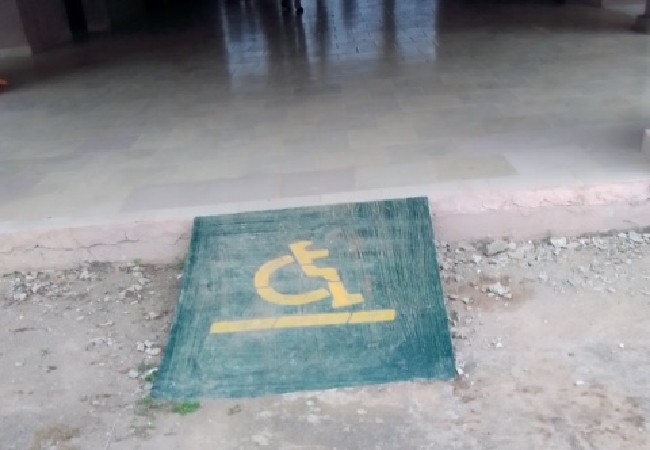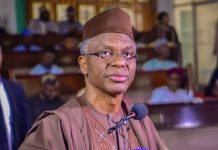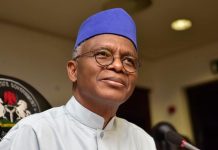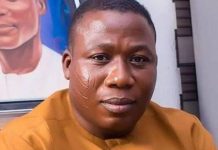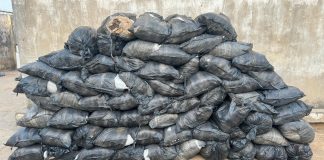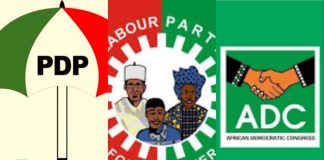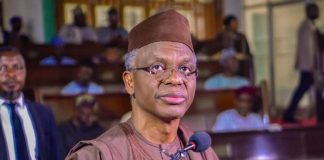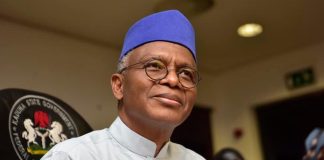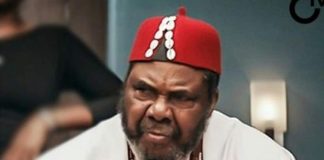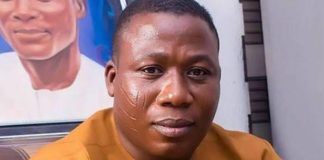🌿 Ruzu Non-Alcoholic Herbal Bitters
Ruzu Non-Alcoholic Herbal Bitters is a natural health supplement specially formulated to:
- ✅ Promote general wellness
- ✅ Detoxify the body
- ✅ Support the treatment of various ailments
Made from a powerful blend of 100% organic and medicinal herbs, Ruzu is completely alcohol-free, making it ideal for:
- 👪 All age groups
- 🌱 Health-conscious individuals
- 🌿 Anyone seeking non-alcoholic herbal remedies
Whether you're looking to boost your vitality, cleanse your system, or support healing the natural way, Ruzu Bitters offers a trusted herbal solution.
Oguntade Nafisat, an HND2 student of Accountancy at Federal Polytechnic, Ede, stated that during her ND1 days, her classes used to be held on the first floor of the department. Consequently, she always had to wait for someone to help her with her wheelchair up the stairs, due to her mobility impairment. Nafisat mentioned that during that time, she often experienced a lot of backaches.
She explained that in her hostel, there are too many steps, and she always has to ask people for assistance. She praised her roommates for their support.
Nafisat’s Hostel
Currently, Nafisat’s classes have been relocated to the South Campus, while the school hostel where she resides is on the North Campus. She mentioned, “Everyone going to the South Campus has to go to the Ogberin main gate and then wait for buses or tricycles.” Additionally, she shared that last Monday when she went to class, one of her lecturers assisted her.
Responding to the question of whether the school has made any accommodations for her convenience, Nafisat said, “I am the only one with this condition in Accountancy who goes to the South Campus. When I learned that they were relocating us to the South Campus, I went to my HOD to discuss some issues with him. He mentioned that I would have to manage since there are only 3 days of lectures per week.”
Naomisophyblog checked the distance between the North and the South Campus on Google Earth. The distance between the two main gates of the campuses is 4.3 kilometers.
Oguntade Nafisat
United Nations Treaty
Nigeria is a part of the United Nations Sustainable Development Goals, but experts believe it is falling short in meeting most of them. United Nations Sustainable Development Goal 4, Quality Education/Education For All, aims to provide fair and inclusive quality education while encouraging lifelong learning for everyone.
Under SDG 4 targets, the UN strives to eradicate discrimination in education by 2030. The goal is to eliminate gender disparities in education, ensure equal educational opportunities at all levels, and offer vocational training for vulnerable groups like persons with disabilities, indigenous peoples, and children in precarious situations.
SDG 4 emphasizes the need to establish inclusive and efficient schools for students with disabilities. Countries are urged to provide adapted infrastructure and materials to facilitate their learning. The UN cautioned that Nigeria’s inadequate investment in education hinders its progress towards achieving SDG 4 by 2030.
More Students Narrate their experiences
Peter, an HND2 student of Computer Science at Federal Polytechnic, Ede, explained that coping has been very easy. He elaborated that his department recently relocated to the South Campus this second semester. “Sometimes I take a Korope or Keke Napep to the South Campus.” Peter walks with the support of clutches due to his mobility impairment.
Peter also described his hostel experience as relatively easy. “I can fetch water by myself, clean my room,” he said. He also mentioned that his roommates and the cleaners in the hostel help him out.
Peter
Peter mentioned that during ND1, his classes were always upstairs. Consequently, he has to navigate the stairs with his crutches. He finds all these experiences easy because he has been accustomed to them since childhood.
READ ALSO:FEATURE: Residents, traders groan as robbery, accidents increase on Abeokuta-Sagamu road
Blessing, an HND1 student in the Department of Nutrition and Dietetics, explained that her OND days were very stressful, but her HND days are better because she is now very conversant and used to the process. Due to Blessing’s mobility impairment, she is on a wheelchair. The only issue Blessing has at the moment is the rough road leading to her house.
Road leading to Blessing’s house
Blessing receives all her lectures at the Centre for Entrepreneurship Development building, which is very close to the Ogberin main gate. Blessing always enters the building through the side door because it is easier to access compared to the main entrance at the front. She said, “The issue there is that the person who is supposed to open the side door may not come early. Sometimes, I wait, and other times, I beg my coursemates to assist me through the main entrance.”
Entrepreneurship Development Building
Blessing said, “The school does not really have anything to do about it.” She explained that during her ND days, she complained to her department’s president, and he said that there was nothing they could do about it. Blessing stated that she has never stayed in the school hostel because she cannot cope with the limited space; she needs a whole lot of space.
In a conversation with the Public Relations Officer of Federal Polytechnic, Ede, he explained that the question being posed is “not meant for the management or, by extension, the institution. Can you just contact the Osun State government or any other agency in charge?” he said. He stated further that there are always regulatory bodies monitoring their activities. As such, the institution is always striving not to cross the “red line.”
This reporter checked out some structures within the school environment and the buildings are not structured in ways that allow for accessibility to Persons With Disabilities. Also, there appears not to be any form of special learning aids being made available for these individuals because in conversations with them, they explained that the school did not necessarily put anything in place specially for students who are of special needs.
Obafemi Awolowo University Students
Samuel, a student of Obafemi Awolowo University, is visually impaired and also happens to be on crutches. Samuel does not consider his experiences strange anymore because “I have been facing it right from primary school”. He complains about how bike riders are always moving recklessly on the road without considering pedestrians. He said, “I know how many times I have had to run with my crutches on the road just because a bike was coming”.
Samuel further stated that he is not really experiencing challenges in school due to his condition because he is a partially sighted individual. He said, “people are always there to offer their helping hands”.
Adewunmi Ebunoluwa, a political science student in OAU had a different tale to tell. She explained that there is limited access to resources like braille and digital texts. Ebunoluwa also spoke about how she finds it difficult connecting with her pairs due to her visual impairment. According to her, there appears to be a form of stigmatization placed on individuals like herself with visual impairment and other forms of disabilities. She said, “there is a lack of understanding about visual impairments and how to support students”.
In OAU, although Persons With Disabilities are not so numerous, there appears to be a form of inclusivity being made available for them. Some of the buildings in the school have ramps that allow for access of buildings by person’s with mobility impairment. Nonetheless, Obafemi Awolowo University is an Institution where individuals get to climb a whole lot of stair ranging from the walkways to the lecture halls. As such, not all of these are convenient for individuals with mobility impairment.
In a conversation with the Public Relations Officer of Obafemi Awolowo University, Mr Abiodun Olanrewaju, he explained that OAU has been established for over 50 years and has been providing inclusivity for students with disabilities. He said, “We have students with special needs in our university here and we care for them”.
University of Ilesa
During this reporter’s visit to the University of Ilesa, he noticed that the structures are built in ways that allow for easy access for Persons With Disabilities. The University of Ilesa, formerly Osun State College of Education became recognized as a university in September, 2022. As such, some of the buildings are recent and they abide by the laws that state that public places should be accessible to Persons Living With Disabilities.
Some of the buildings in University of Ilesa with Ramps
A Ramp to make persons using wheelchairs access the building
In an attempt to understand the management’s efforts towards promoting inclusivity for students with disabilities, this reporter was tasked with writing a letter addressed to the school’s Registrar outlining the purpose. The letter hwas written and submitted. But as of the time of filing this report, no response had been received from them.
Federal and State Disability Laws
The Osun State government recently passed the Osun State Prohibition of Discrimination Against Persons With Disabilities Bill, 2024. The primary aim of the act is to eliminate discrimination against PWDs in all aspects of life, including health, education, employment and access to public services. The act mandates that public buildings and facilities must be accessible to Persons with Disabilities. This includes provision of ramps, accessible restrooms, amongst other things. The act also ensures that Persons With Disabilities have equal access to educational opportunities and facilities, thereby promoting inclusive education practices.
The provisions in the Osun State Act are similar to those found in the federal Act, Discrimination Against Persons With Disabilities (Prohibition) Act, 2018. The federal act also emphasizes accessibility, equal access to education, and non-discrimination in employment.
Expert Opinion
In a conversation with Mr Yinka Olaito, the Executive Director of the Centre for Disability and Inclusion Africa, he explained that the Disabilities Acts, 2018 made lack of accessibility to any public building punishable from 2024.
Mr Yinka said, “In fact the newly ratified edition has made owners of inaccessible buildings liable if found convicted.”
He proceeded by saying, “Building codes also stipulate from at least 3 storey and above you have s lift or be constructed in a way that makes accessibility easy.” He restated that accessibility goes beyond ramps as that will only meet needs of mobility challenged persons. A mandatory part of the DAPDA 2024 bills is the right of PWDs to rights to education. “Till date many higher institutions of learning in Nigeria have no formal structure for inclusiveness in outlook. The few that seem to be, only made provision for mobility impaired persons and ostracized other clusters like visual, hearing, speech, intellectual disabilities among others”, he said.
He further explained that the need for accessible structures should not be seen as needful but mandatory. Mr Yinka also made it known that this is one of the focal points for the Center for Disability and Inclusion Africa. He said, “today again we renew our call to both public and private institutions to consider Inclusion as a long term mutually beneficial issue. This will promote equity and inclusive, sustainable society.”
The post FEATURE: How students with disabilities in Osun tertiary institutions struggle with accessibility appeared first on Latest Nigeria News | Top Stories from Naomisophyblog.

